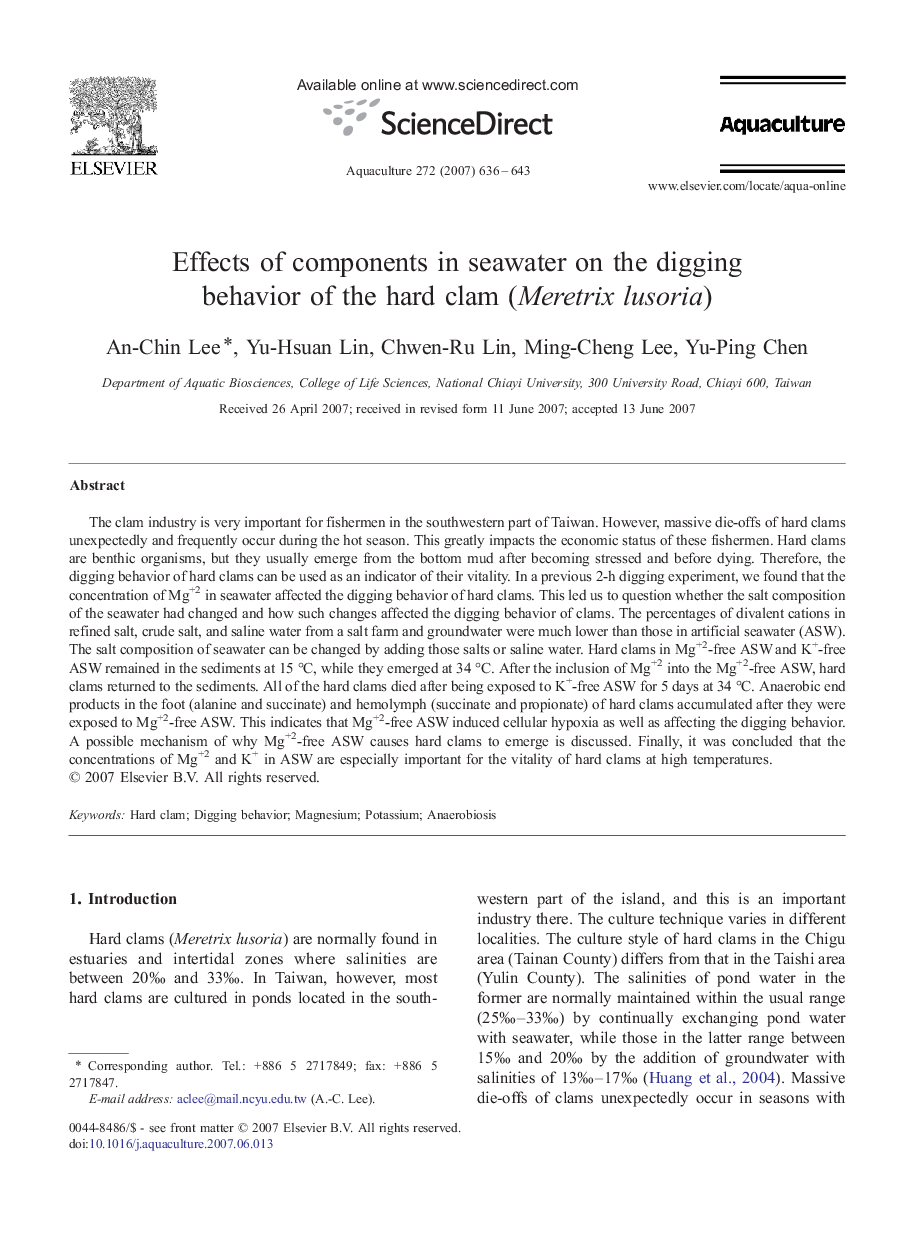| کد مقاله | کد نشریه | سال انتشار | مقاله انگلیسی | نسخه تمام متن |
|---|---|---|---|---|
| 8496670 | 1552970 | 2007 | 8 صفحه PDF | دانلود رایگان |
عنوان انگلیسی مقاله ISI
Effects of components in seawater on the digging behavior of the hard clam (Meretrix lusoria)
دانلود مقاله + سفارش ترجمه
دانلود مقاله ISI انگلیسی
رایگان برای ایرانیان
موضوعات مرتبط
علوم زیستی و بیوفناوری
علوم کشاورزی و بیولوژیک
علوم آبزیان
پیش نمایش صفحه اول مقاله

چکیده انگلیسی
The clam industry is very important for fishermen in the southwestern part of Taiwan. However, massive die-offs of hard clams unexpectedly and frequently occur during the hot season. This greatly impacts the economic status of these fishermen. Hard clams are benthic organisms, but they usually emerge from the bottom mud after becoming stressed and before dying. Therefore, the digging behavior of hard clams can be used as an indicator of their vitality. In a previous 2-h digging experiment, we found that the concentration of Mg+2 in seawater affected the digging behavior of hard clams. This led us to question whether the salt composition of the seawater had changed and how such changes affected the digging behavior of clams. The percentages of divalent cations in refined salt, crude salt, and saline water from a salt farm and groundwater were much lower than those in artificial seawater (ASW). The salt composition of seawater can be changed by adding those salts or saline water. Hard clams in Mg+2-free ASW and K+-free ASW remained in the sediments at 15 °C, while they emerged at 34 °C. After the inclusion of Mg+2 into the Mg+2-free ASW, hard clams returned to the sediments. All of the hard clams died after being exposed to K+-free ASW for 5 days at 34 °C. Anaerobic end products in the foot (alanine and succinate) and hemolymph (succinate and propionate) of hard clams accumulated after they were exposed to Mg+2-free ASW. This indicates that Mg+2-free ASW induced cellular hypoxia as well as affecting the digging behavior. A possible mechanism of why Mg+2-free ASW causes hard clams to emerge is discussed. Finally, it was concluded that the concentrations of Mg+2 and K+ in ASW are especially important for the vitality of hard clams at high temperatures.
ناشر
Database: Elsevier - ScienceDirect (ساینس دایرکت)
Journal: Aquaculture - Volume 272, Issues 1â4, 26 November 2007, Pages 636-643
Journal: Aquaculture - Volume 272, Issues 1â4, 26 November 2007, Pages 636-643
نویسندگان
An-Chin Lee, Yu-Hsuan Lin, Chwen-Ru Lin, Ming-Cheng Lee, Yu-Ping Chen,